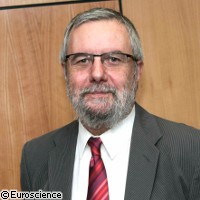Science and political will: An interview with Euroscience president Dr Enric Banda
Dr Enric Banda, a geophysicist and president of the 2,100-member-strong grassroots organisation Euroscience, spoke with CORDIS News about the importance of young scientists, the impact of economic crises on scientific careers and the challenge of building a strong science and technology base in Europe. Euroscience is an 11-year-old organisation that gives a voice to scientists at the European level. 'It's an organisation of individuals, not institutions,' explained Dr Banda. One of the many purposes of the organisation, he said, is influencing and orienting the political world; however, this can be an uphill battle. 'The political world is certainly deaf to scientists and people interested in science,' he said. 'Politicians talk about science and technology and forget about it a minute later.' 'Science is inevitably a protagonist in the public world,' he said, adding that Euroscience really works to foster a strong science and technology base for Europe. 'This is our ideal, and this is what we work for. And one of the ways we do it is through young scientists.' Euroscience strives to help young scientists by offering guidance and encouraging them to follow careers in science, wherever opportunities might present themselves in Europe. The current economic crisis is certainly bound to have an impact on those just starting their careers, Dr Banda said, but expressed hope that the fundamental need for business to innovate will likely soften the blow. 'Unfortunately, I do believe that there will be some damage done to the science world in terms of public money getting into science,' he said. 'Crises normally mean cutting budgets, and science is an easy place, from a political point of view, to make cuts.' But this financial crisis will not last forever, he added. 'One cannot work on the basis of, 'there is a financial crisis, I will not be able to get a job'; you may be hit by the crisis, and it might take you longer to find a job, but you will find a job,' he noted. 'In the business world, I am not sure that the innovation part of the companies will suffer a lot because they do understand that that's the way out of the crisis. So altogether I'm not that pessimistic,' he added. 'If we turn to the private, industrial, services worlds, knowledge is also the best way to compete these days. So I cannot really believe that people think that by getting deeper into a career they will get into a 'no job' situation.' According to Dr Banda, universities tell a different story. Because competition is fiercer than ever, achieving a full professorship, even after a long career, is not a fait accompli for those choosing to stay in academia. But there are many more directions a scientific career can follow these days, especially if one is willing to move. 'We live in a global world,' he told CORDIS News. 'There is enough space in the world for these people to work somewhere else. Now if you want to work at home, it might be difficult. 'Mobility is a European problem,' Dr Banda said. 'I come from southern Europe so I can criticise our desire to do everything around the village where we were born, [spend] all our career not far from there, finish our professional life not far from there, be buried not far from there.' 'We still have problems, and still have difficulty getting visas for scientists who are not European. So mobility is still a problem in Europe that I hope we can fight,' said Dr Banda. 'Because mobility gives dynamism to the system, as we can see in the US.' Regarding the recently announced roadmap for European research infrastructures as set out by the European Strategy Forum on Research Infrastructures (ESFRI), Dr Banda is optimistic. 'It's high time Europe had a roadmap for what the infrastructures of the future should be, and I believe ESFRI has been successful in that. But we're still stuck, politically speaking [...] We have a long wish-list of infrastructures - all of them would be good for Europe, but this is not enough. The political will to do these things at the European level is still lacking, and if not lacking is still weak.' Communication is the cornerstone of Euroscience. In addition to a new online publication, The Euroscientist, which covers topics of wide scientific and political interest, the organisation pulls together a densely packed and well-attended open forum biennially. The forum exists, Dr Banda said, to give everyone a voice and a chance to share their opinion. 'It is not only for scientists, rather it is for policy makers, entrepreneurs, and ordinary citizens, for business and for journalists,' he said. The next open forum will be in Torino, Italy in 2010, and the 2012 forum will take place in Dublin, Ireland.



